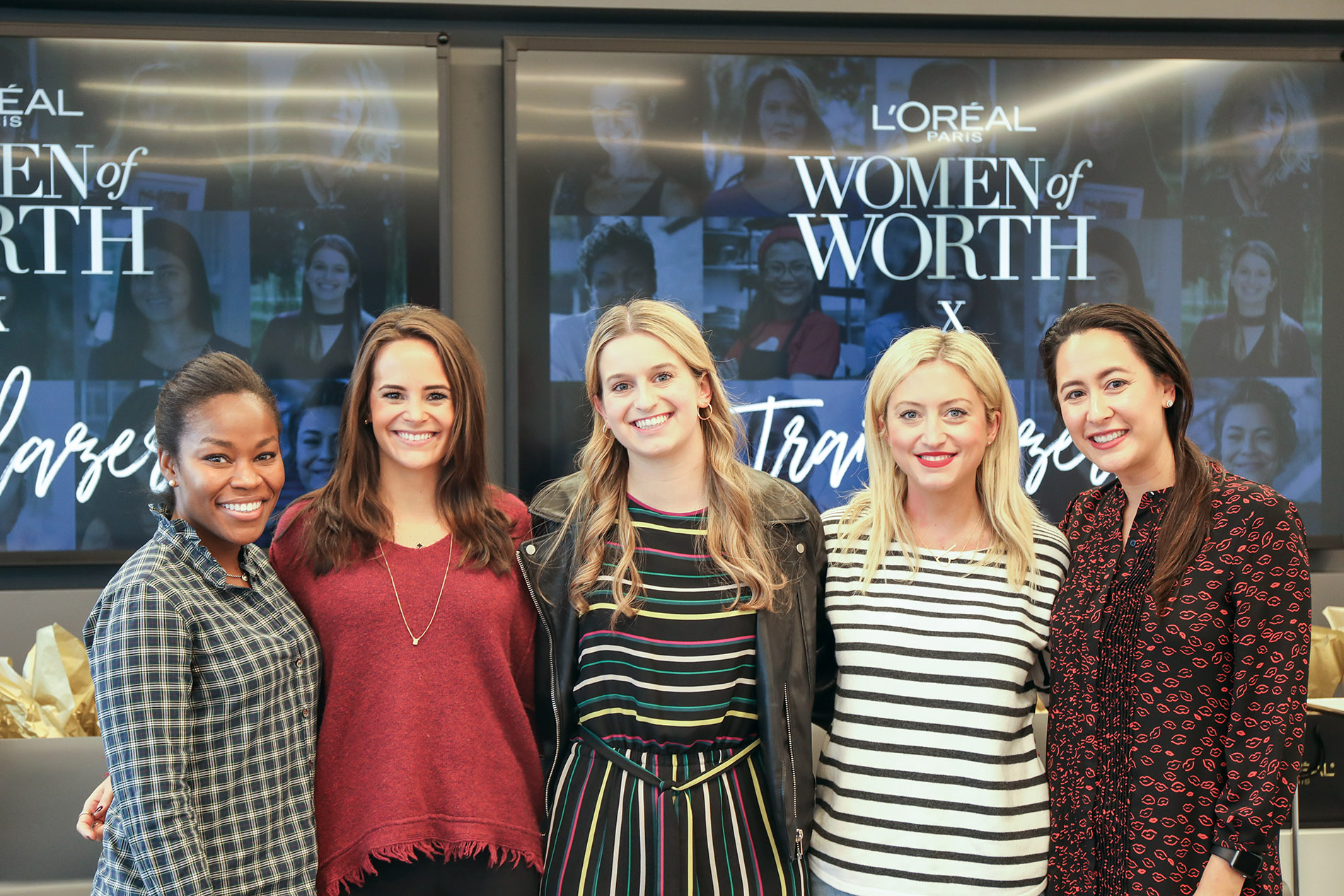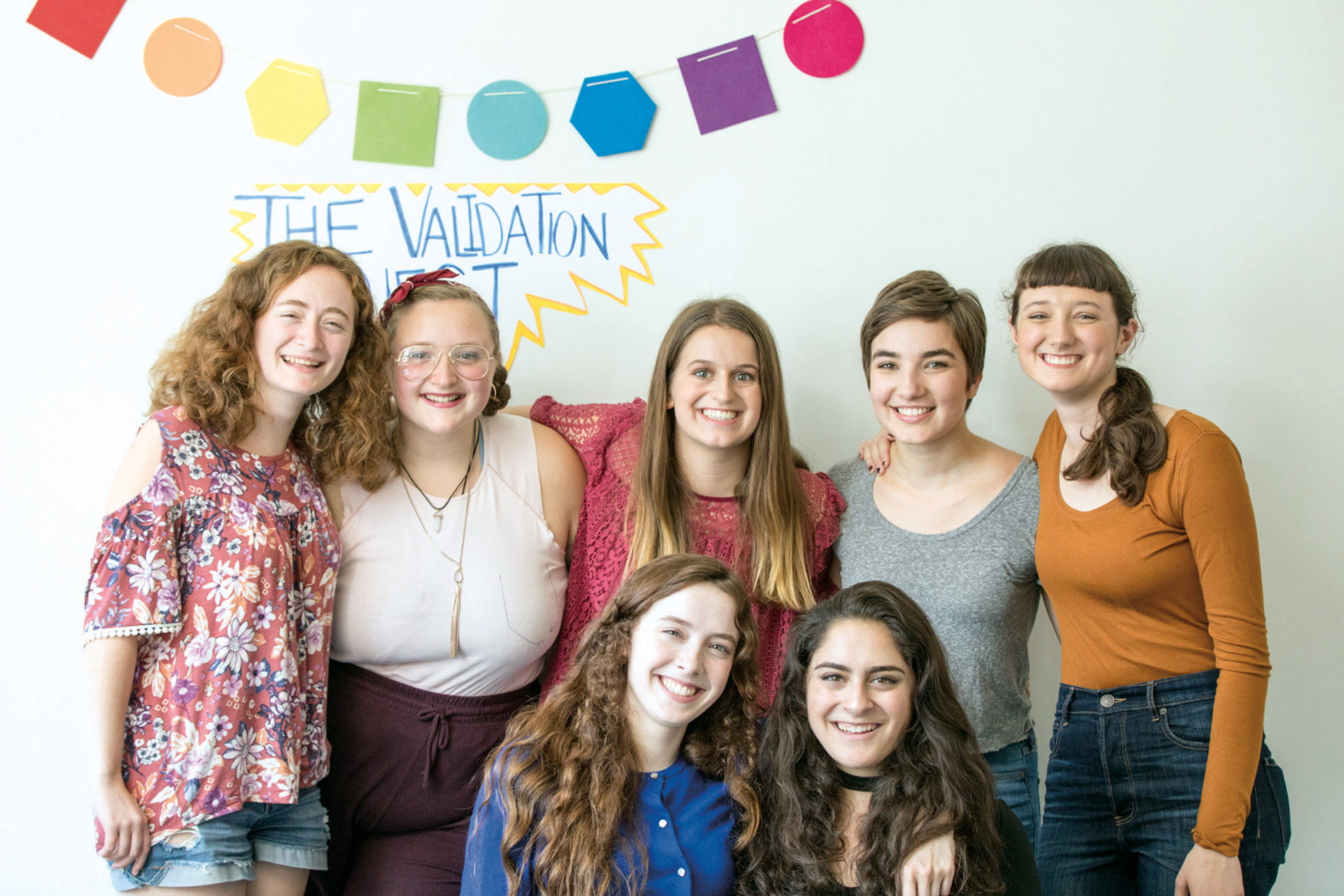Validation
Val Weisler ’20 helps empower young people around the world.
By Meghan Kita
Lead photo by Brooke Slezak
Val Weisler ’20 estimates that she’s told the origin story of The Validation Project, the youth empowerment organization she launched as a freshman in high school, hundreds of times to tens of thousands of people. It goes like this: She was 14, living in a New York City suburb about 30 miles north of Manhattan, and her parents were getting a divorce. In the emotional turbulence, she became painfully shy. Bullies noticed: “Can you even speak?” they’d ask her. They’d leave nasty notes in her locker. She started to dread school.
One day, she witnessed a classmate being bullied. After the incident, she approached him and told him what she wished someone would tell her: “You matter.” He confided in her the thoughts of self-harm he’d been having and the difference that her small act of kindness had made. It was a turning point: She’d found her voice again, and she vowed to use it to help even more young people who were struggling. And so, in 2013, The Validation Project was born.

Weisler speaks at WE Day in Toronto’s Air Canada Centre in September 2017 to an audience of 60,000. The WE Day events, held in 19 North American cities, are designed to inspire children to effect positive change. Other speakers on the docket with Weisler included Prince Harry, former Secretary-General of the United Nations Ban Ki-moon and actor Mia Farrow.
The story Weisler hasn’t told as often, at least in its entirety, is the story of how The Validation Project has continued not just to exist but to thrive, even through her transition to life at Muhlenberg and a semester abroad this spring in Seville, Spain. It has continued to exist because Weisler loves working with elementary, middle and high school students and their educators. And it has thrived because Weisler’s approach is novel: Instead of telling kids “don’t be a bully,” her “kindness curriculum” helps them discover the positive things they can be.
“If I knew how much it would grow when I started it, I probably would have been too nervous to start it,” Weisler says. “No other experience of me interacting with people was positive at that time. I didn’t have anything to lose then. My self-doubt supported it, because I couldn’t see what it could become.”
The numbers that demonstrate what it has become are staggering: The Validation Project has engaged about 20,000 students in 105 countries (16 of which Weisler has traveled to herself). Ninety percent of the approximately 1,000 partner schools report a difference in bullying within months of the introduction of The Validation Project’s curriculum. Weisler has spoken for crowds of more than 60,000 people and at events at both Google and Facebook.
In 2017, Weisler won a $10,000 L’Oreal Paris Women of Worth award, which provided funds that allowed The Validation Project to obtain 501(c)(3) status the following year. This spring, Weisler was named a Truman Scholar, an honor bestowed upon just 62 students annually who are interested in a future in public service. The scholarship will help her to pursue graduate studies, possibly in education policy and law.
“I love leading The Validation Project, but so much of what I do is activism in isolation. It’s a lot of sitting at my kitchen table or in the GQ talking with someone who lives thousands of miles away about something we can do thousands of miles away,” Weisler says. “So, for me to be able to join a group of peers equally excited about public service is like a dream come true.”
From Humble Beginnings
The Validation Project has come a long way. After that first meaningful interaction with a classmate who’d just been bullied, Weisler went home and built a website that addressed her school’s bullying problem. She shared it on Facebook, classmates chimed in with their stories of victimization and they started a lunchtime meetup group. Coming together to do something positive became the foundation for The Validation Project.
From the start, The Validation Project has had two main components. The first—and still the biggest—component is the aforementioned kindness curriculum. “We provide resources for educators to lead programs about social justice issues, self-confidence and self-worth, and to have healthy, proactive conversations about how students can use their worth out in the real world,” Weisler says.
What that looks like in practice can vary from school to school, but when Weisler visits to introduce the kindness curriculum, it usually goes like this: She begins with a presentation that shares her story and the lessons she’s learned. Then, she conducts an empowerment workshop: Each student comes up with a social-justice initiative related to a topic they’re passionate about, which they pitch to the group. “The main goal is when I leave, the students have something tangible they could do,” Weisler says. For example, one middle school student imagined a talent show that would benefit a nearby school without funding for an arts program.
When she’s unable to visit in person, she talks through the curriculum with that school’s educators via calls and emails. The goal is “to build a team-based environment in schools to make conversations of self-worth and social justice the norm,” she says. “Bullies see they can feel big not by hurting someone else but by helping someone else.”
The second long-term component of The Validation Project is one-on-one mentoring. This can be for students who’ve gone through the kindness curriculum and are interested in doing more or for students who reach out to The Validation Project directly, who don’t have its programming at their school. Weisler—in collaboration with that student’s teacher, when possible—connects the student with a mentor to teach them about a topic of interest. Once the student has learned from the mentor, they apply what they’ve learned in their community. Weisler gives the example of a student with a chef as a mentee: Once the student has learned some basic cooking skills, perhaps they volunteer to help in the kitchen of a local homeless shelter.

Weisler attends the launch of her Trailblazers program in New York City. With her are four employees of L’Oreal Paris who participated in “mentor speed dating” with the inaugural group of Trailblazers.
Newer Initiatives
Weisler has experimented with a variety of other initiatives over the years as well. One that’s ongoing is her Trailblazers program, which she launched last November in partnership with L’Oreal. In it, a company or organization hosts a group of girls from a local public high school for a day. The girls meet and converse with women in leadership roles there, as well as social-justice leaders and senior leadership. Long-term, the girls who are “inducted” as Trailblazers have access to opportunities to lead and learn in their home city, which Weisler shares with the educator point-person at the girls’ school.
So far, there are about 50 total Trailblazers in New York City (where events were held at L’Oreal and Facebook) and Boston (where events were held at Education First and Harvard University). During her senior year, Weisler hopes to build the program at William Allen High School, where it can complement the College Admission Mentoring Program (CAMP) run by Professor of Political Science Michele Deegan. Weisler’s goal for this summer is to start building a network of college women that Trailblazers can look to as a resource.
“Networking is such a giant part of being able to achieve higher education,” Weisler says. “Obviously, that’s coded with so much privilege, to know someone who is in an institution of higher education.” She hopes to utilize her Truman peers as well as her press contacts to locate students from a variety of schools to serve as contacts and mentors.
The other ongoing Validation Project initiative is called Popcorn Pop-Ups: screenings of films relevant to young women followed by discussions that include female leaders. It launched with a screening of RBG in Allentown; Beth Halpern, director of Muhlenberg’s Office of Community Engagement (OCE), connected Weisler with partner organizations for that screening. The two had previously worked together when Weisler participated in the OCE’s Civic Fellows program, which includes a noncredit course to deepen students’ understanding of community engagement.
“I’ve seen Val understand the nuance of local context more through her work in Allentown communities,” Halpern says. For the first Popcorn Pop-Up, “she was trying to partner with a bunch of different nonprofits and organizations with varied constraints and access to resources, including transportation and timing. It was a totally different context, away from her home community, that she had to navigate. And through her involvement, she’s grown to love Allentown as home.”
Weisler is planning to show Eighth Grade, a coming-of-age-in-the-age-of social- media tale, when she’s scheduled to speak in Columbus, Ohio, and Montreal this summer. The screenings are open to the public and are meant to be a way to reach students beyond the confines of the classroom.

Weisler (center) with (clockwise from top left) Jenny Silber ’20, Melina Economos ’19, Kieva Mark ’20, Brooke Weber ’20, Rebekah Nachman ’20 and Kylee Jacoby ’20 during Weisler’s sophomore year. All have served as Validation Project Program Collaborators—individuals of college age or older who assist in campaigns and workshops.
The Muhlenberg Factor
Weisler found Muhlenberg thanks to one of her long-term mentors, Jessica Abo, journalist, speaker and author of Unfiltered: How to Be as Happy as You Look on Social Media. Weisler met Abo in high school, when Abo was speaking to a large group of students.
“It’s been a pure gift being her mentor and friend all these years,” Abo says of Weisler. “It’s 2019, and we still need to teach people of all ages how to be kind, how to have empathy and how to champion the next generation of changemakers...Thankfully, Val is giving today’s youth the tools they need to not only feel empowered, but also the framework they need to empower the people connected to them.”
When it was time for Weisler to consider higher education, Abo had a recommendation. “I grew up in Bethlehem and always knew Muhlenberg was a great school,” she says. Abo connected Weisler with family friend Art Altman ’53 P’84 GP’13, a former trustee, and Altman arranged for Weisler to meet with Chris Hooker-Haring ’72 P’08 P’10, former vice president for admissions.
Weisler fell in love with the College’s small size and location. “I liked that I’d be at a place where I wouldn’t be the odd one out for being interested in so many different things,” she says. “I was immediately interested in Allentown, and the idea of being able to walk downtown, go to the Farmers Market or explore more of the Lehigh Valley was so cool.”
Once at Muhlenberg, Weisler took a special interest in Professor of Education John Ramsay’s History of Education class. The activism aspect of education fascinated her. Ramsay informed her that designing a major was an option, so that’s what she did. Weisler decided education advocacy was the major she wanted, so she tracked down the curriculum for a similar program at another college, contacted professors here who offered comparable courses to find out when they’d be teaching those courses again, designed a list of required courses and presented her plan to the curriculum committee for approval.
She’s found the curriculum—which includes many education, political science and international relations courses—has given her better language with which to talk about her Validation Project work, specifically about “school climate.” “I’ve learned about how a conversation, or an absence of a conversation, can have a domino effect on a student’s emotional well-being at school,” Weisler says.
Her major led her to Seville, where all her classes were in Spanish, her minor; fluency will help Weisler advocate for and interact with students whose first language is Spanish. While abroad, she collected interviews with five education activists in three European countries to use for her senior thesis. And that wasn’t the end of her spring travels—at the end of May, she went to Missouri for the Truman Scholar Leadership Week and then to Tokyo as the U.S. delegate for the G(irls)20 Summit. “When I read about [the summit], it was like someone had taken my dreams and put them into a program,” Weisler says.
G(irls)20 brings together young female delegates from across the world to build leadership skills and help advance female economic inclusion. Weisler heard about the summit from Kate Ekanem ’21, an international student from Nigeria who represented the African Union at the summit in 2015. Through Ekanem, Weisler met Lauren Anderson ’79, an international geopolitical consultant who’d previously served as an advisor to G(irls)20, and Anderson helped Weisler hone her application. There were more than 1,600 applications for the 24 delegate positions this year.
Weisler found the programming— which included workshops on negotiating and leadership, panels featuring changemakers and the opportunity to create and deliver a communique with recommendations to Ambassador Koji Tomita, Japan’s G20 Sherpa—to be a valuable bridge between the work she’s doing now and what she hopes to study and pursue after leaving Muhlenberg.
“I want to continue The Validation Project, but I’m also really passionate about how the government plays a role in education advocacy,” Weisler says. The summit was “a rare and crucial opportunity for young women like me to collaborate with one another to ensure we’re represented in conversations about the issues that affect us. It ties back to my work with The Validation Project because it’s the same message: taking young people together and giving us the resources we need to shake up the world.”

